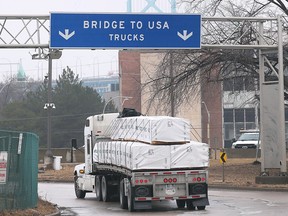Since Trump took office four weeks ago, St-Gelais has seen a drop of about 25 per cent in orders from Canada and the United States

OTTAWA — Steeve Gelais listened nervously on Monday as U.S. President Donald Trump listed industries he might want to impose tariffs on.
It turns out that cars, pharmaceuticals and semiconductor chips were on the president’s mind that day and St-Gelais could breathe again because the words “lumber” or “forest” didn’t come up.
“Will he wake up tomorrow morning and want to say, ‘Well, we’re going to do something specifically for wood’,” he wondered.
St-Gelais is the president of Boisaco, a forest products company based on Quebec’s north coast that employs about 600 people and relies on the U.S. market for about 10 per cent of its business.
The company’s $200 million in annual revenue isn’t enough to dominate the Canadian landscape, but it’s an economic superpower in the Sacré-Cœur community of just 10,400 people.
The reason St-Gelais is so nervous is that since Trump took office four weeks ago, he’s seen a drop of about 25 per cent in orders from Canada and the United States. His customers are buying just enough to cover their short-term needs, waiting to see if the president will take on the industry.
“There’s uncertainty and people are very cautious,” he told the National Post.
With the threat of a 25 per cent tariff coming on March 4, the forest industry is walking on eggshells. But more importantly, the president could well add a specific tariff on softwood lumber.
This week, a delegation from the Forest Products Association of Canada went to Washington to meet with American stakeholders and elected officials.
“They really need the products we’re sending them. The facts are the facts,” said Jean-François Samray, CEO of the Quebec Forest Industry Council who participated in the trip.
But in Canada, and this is particularly the case in Quebec, stakeholders fear that the industry will not have the strength to fight another wave of tariffs.
Currently, the softwood lumber industry is already subject to a 14.4 per cent levy with the United States. While the aluminum sector didn’t seem too worried about a potential 25 per cent tariff, forestry industry players are increasingly concerned about Trump’s upcoming tariff decisions. Logging operations, sawmills and pulp and paper mills have all seen closures and job losses in recent years.
“It’s a very different story for aluminum than it is for the forestry sector… The margins in that sector are much smaller, so it’s harder for companies to weather additional tariffs,” said Rachel Samson, vice-president of research at the Institute for Research on Public Policy.
Samray says the Quebec industry is facing a perfect storm with a forestry regime that is “dying,” wildfires and now the threat of massive tariffs.
“In some cases, there will be closures. It could be temporary closures it could be longer term closures,” he said. “But tomorrow morning, if tariffs were implemented, I can tell you that Quebec lumber will still cross the border,” he added.
Bloc Québécois natural resources critic Mario Simard is concerned the industry is in a blind spot right now. He says most of the phone calls he’s been getting in recent weeks have been from people in the forestry sector.
“They’re on life support; they’ve been paying tariffs in the U.S. since 2017. If you add 25 per cent for them, it would be a disaster,” he said.
Last week, federal Natural Resources Minister Jonathan Wilkinson visited Washington and, according to his office, no new tariffs on softwood lumber or forest products were discussed during his meetings. Meanwhile, the president was telling the press in the Oval Office that “we don’t need (Canada) for lumbers, we don’t need them for anything”.
“Our first priority is to remove all tariffs and tariff threats permanently. We will support Canadian industries as necessary should additional tariffs come in and cause economic disruption,” said Wilkinson’s spokesperson Carolyn Svonkin.
Every year, the United States consumes about 50 billion-foot board measure (FBM) of lumber and produces about 30 billions.
Adding tariffs would increase the price Americans pay for wood products, but it would also overflow the Canadian market, impacting smaller players like Boisaco.
“That could ultimately completely undo the dynamics of the Canadian market which would automatically impact us,” St-Gelais said.
Our website is the place for the latest breaking news, exclusive scoops, longreads and provocative commentary. Please bookmark nationalpost.com and sign up for our daily newsletter, Posted, here.